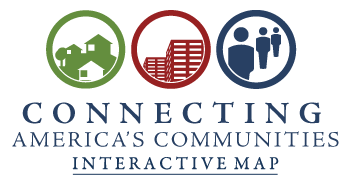BTOP in Action
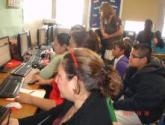
The City of Boston is partnering with OpenAirBoston to help
low-income residents acquire the digital literacy skills needed for today’s technology-driven society through the Technology Goes Home (TGH) training program. This school-based family computer distribution and education initiative offers digital literacy training to students and their families across 52 public middle and high schools. Through March 2012, approximately 5,000participants have taken part in the program and earned a free netbook computer, and more than 300 families acquired new broadband subscriptions.
Through the TGH program, new users receive 15 hours of classroom training on a variety of topics, including computer basics, resume creation, and job searches. The program also offers classes on financial literacy, helping students and parents understand everything from credit cards to home mortgages.
In post-class surveys, 88 percent of adult program participants say they are likely to use online resources for job searches, and 80 percent are more likely to use online resources for banking. Additionally, the city has seen how TGH strengthens parents’ connections to school, each other, and their children. Sixty-four percent of English-speaking parents and 80 percent of non-English-speaking parents indicated that they had never participated in their child’s school before TGH. After completing the program, 98 percent of parents said they planned to become more involved with their children’s school.
TGH also makes acquiring digital literacy skills accessible to several underserved populations. For example, TGH provides blind students and their families with new Internet-based tools and applications that help them interact with the world. Additionally, TGH offers classes in eight different languages, including Spanish, Mandarin, Somali, and Haitian Creole. The program helps families integrate into their communities, providing them with a supportive network to help navigate parenting challenges. For example, parents in the Somali refugee community told program trainers that they felt disconnected from their children after coming to the United States. Enrolling in TGH helped them to better understand their children’s experiences and connect with them using technology.
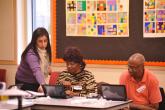
City of Chicago (SBA)
To spur economic development in five disadvantaged neighborhoods across the city, the City of Chicago’s Smart Communities program created the Business Resource Network (BRN), an initiative designed to help local businesses become sustainable, profitable entities by providing them free access to broadband, business software, and technology workshops. The BRN helps local companies acquire the broadband services, computer applications, and skills needed to succeed in today’s digital economy.
Small and medium-sized businesses participating in the BRN first conduct a technology needs assessment, which helps them identify new computer resources and skills. Once needs are identified, these businesses develop an action plan and map out an approach and timeline for acquiring computer equipment and business training. Businesses then participate in workshops and one-on-one consultations on a variety of topics, including software training, business planning, marketing, and website development.
Through December 2011, more than 180 businesses completed a technology assessment, 105 developed action plans, and 220 participated in workshops. For example, a local restaurant owner, who participated in the BRN, was able to increase his customer base by developing a marketing plan to promote the restaurant’s newly installed wireless Internet network. Additionally, a local resident received a raise at her job after completing one of the program’s Microsoft® Office classes. BTOP funding has also allowed the City of Chicago to create new jobs, hiring 17 full-time and 29 part-time staff for administration support and training.
In addition to providing resources for small businesses, the Smart Communities program also offers resources to help community residents develop digital skills. Residents can participate in digital literacy classes, covering topics such as computer basics, Internet fundamentals, and online banking. Through December 2011, nearly 10,000 Chicagoans participated in the program’s digital literacy classes.
Last updated: April 17, 2012
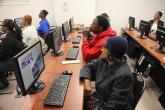
The City of Chicago opened two new public computer centers and upgraded 14 in communities throughout the city to help low-income residents acquire the digital literacy skills needed for today’s workforce. These centers provide free access to broadband, digital literacy classes, and workforce development workshops to help individuals acquire the skills needed to find and retain jobs.
BTOP funds have allowed the project to deploy more than 970 new workstations in libraries, public housing sites, workforce facilities, and senior centers that are located in economically vulnerable areas of the city where community members often cannot afford broadband access. The centers offer classes such as computer basics, Internet fundamentals, Microsoft® Office, and business email writing techniques. Center visitors can also receive assistance with resume creation, job searches, interview preparation, and scholarship applications. Through March 2012, more than 2,000 people have participated in these classes.
In addition to helping center visitors with job searches, some of the computer centers are hiring participants who successfully complete training. For example, as of March 2012, the Chicago Housing Authority (CHA) has hired eight former students as training coordinators.
The city’s goal is to help Chicagoans improve their lives through computer resources and educational opportunities. The project plans to upgrade and expand workstation capacity at more than 150 locations and is developing the Digital Skills Initiative, a series of self-paced, online modules that will teach residents computer and workforce development skills. Launching in fall 2012, Chicagoans will have free access to over 300 modules covering topics from computer basics to advanced spreadsheet manipulation.
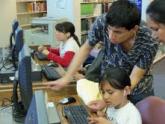
A BTOP Grant is helping the City of Los Angeles tackle the digital divide in its most at-risk neighborhoods. Through the Los Angeles Computer Access Network (LA CAN) project, the City’s Community Development Department, Department of Parks and Recreation and various libraries will develop or upgrade 183 public computer center sites throughout Los Angeles. As part of the $7.5 million grant, the City will purchase 2,600 new computers, in some cases, replacing those that were seven to 10 years old.
The City looked at demographic information such as high poverty and unemployment to determine where to place the new computer centers. For example, one site in the South Broadway neighborhood, originally an abandoned lot full of trash, now hosts the Chicana Services Action Center, including a 25-station public computer center and offering health screenings and job placement assistance. Approximately, one-third of the visitors to the center currently receive public assistance to take computer courses that will enable them to find work.
The LA CAN project expects to serve around 250,000 users each week, including students, job seekers, seniors, and English-as-a-second-language speakers, who use the centers to do homework, find work, learn new skills, and access other Internet-based services.
Last Updated October 14, 2011.
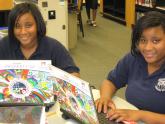
By early December 2011, the City of Milwaukee’s Connecting Milwaukee Communities project opened a new public computer center and upgraded eight centers across the city. These centers are part of an expansion to increase broadband capacity and availability at sites that have historically been unable to adequately serve local residents. These upgraded centers now offer patrons new computers, training, and technology specialists to help them develop their digital literacy skills.
BTOP funds have allowed the project to deploy more than 240 laptops, serving an average of 5,902 users per week. Along with these computers, the centers provide a variety of classes covering topics such as computer basics, Internet fundamentals, word processing and spreadsheet skills, Internet search fundamentals, and online safety. The centers offer career building assistance with resume creation, job searches, and interview preparation.
The new public computer center at the Olga Village Senior Center opened on September 29, 2011. This center boasts 12 new workstations and is customized to accommodate elderly residents who are learning digital literacy skills through computer basics classes and individual trainer assistance.
By the end of the project, the City of Milwaukee will distribute approximately 270 new workstations and train as many as 10,000 city residents. To meet the needs of the city’s diverse population, the City is partnering with the Milwaukee Public Library, the Housing Authority of the City of Milwaukee, the Milwaukee Area Workforce Investment Board, and the United Community Center – Olga Village to provide training classes in both English and Spanish at various sites. The City of Milwaukee has also been able to hire six Library Technology Specialists, responsible for teaching classes and providing one-on-one computer help.
Last updated: January 5, 2012
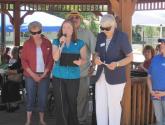
In a world where technology is key to creating opportunities, public computer centers are significant community assets. The Colorado State Library, operating under the Colorado Board of Education, is creating a culture of technology engagement through its public computer center project, Bridging the Great Digital Divide. The project is designed to improve lives by providing computers, training, and public awareness campaigns in 81 Colorado communities.
Since receiving its $2.3 million BTOP grant, and an additional $1 million from the Bill and Melinda Gates Foundation and local libraries, the project has distributed more than $1 million to local libraries and the Southern Ute and Ute Mountain Ute tribes, which has helped them purchase 681 laptops, 487 computers, and 59 tablet computers for community use and training efforts. Two library systems in High Plains and Lamar also hired three new staff to lead public training classes.
In April 2011, libraries began offering training on topics, such as basic computer skills, job skills, and Internet use. In the first three months, Colorado public computer centers offered more than 260 training classes to nearly 3,000 people. Local community partners also are working with the libraries to host training topics including workforce skills, business 2.0 development, and new immigrant literacy. In addition, the State Library staff developed a technology boot camp and curriculum to help library staff and community volunteers become more proficient in technology.
To further the goal of increasing broadband adoption, the State Library also developed a statewide public awareness campaign to encourage community members to visit the centers, take training classes, and adopt broadband. Libraries throughout the state will participate in the campaign by hosting local launch events with open houses and guest speakers. Twenty-seven public computer centers held events from April through June 2011, and additional events are planned for the coming months. The State Library staff also developed nationally recognized tools for gathering local statistics to evaluate the effectiveness of training and outreach.
Through the Bridging the Great Digital Divide project, Coloradoans will learn skills, access online education and health information and be able to participate more fully in the digital economy. Community agencies also can now offer training in ways they were not able to do so before, allowing citizens in remote parts of the state to stay connected with regional resources, such as workforce centers, small business development offices, and regional agricultural offices. Resources and opportunities provided by the Colorado State Library’s project can have a lasting impact on communities across the state.
Last Updated: October 14, 2011
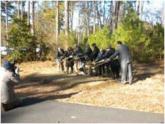
On December 13, 2010, Columbia County initiated construction on more than 220 miles of fiber-optic network at a groundbreaking ceremony near the Columbia County Library in Evans, Ga. This library will serve as the first Internet access point for the new broadband network and house some of the servers needed to operate the network.
Extending throughout the county, the network will connect and increase Internet access speeds at more than 33 K-12 schools, two additional libraries in Grovetown and Harlem, 18 fire departments, as well as several other law enforcement agencies in Columbia County.
In the coming year, Columbia County plans to begin construction on more than five wireless towers, which will provide dozens of free Wi-Fi hotspots in places like parks, libraries, and community centers. In addition, Columbia County will connect the county’s traffic devices, including stop lights, surveillance equipment, and notification boards, to the statewide Intelligent Transportation System (ITS) using the new broadband network, which will improve public safety and traffic flow along the major transportation corridors.
As of March 2011, Columbia County has used BTOP funds to hire three contractors employing over 40 staff to complete network construction. Eventually, the network will be extended to public computer centers and thousands of households that currently have dial-up Internet connections or no access at all, allowing for continued job growth and economic development. The project also has a page on Facebook and Twitter with the latest news. To see local media coverage of the groundbreaking event, please visit The Augusta Chronicle, The Columbia County News-Times, and WRDW-TV News 12.
Last Updated: October 19, 2011.
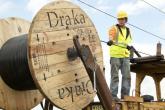
In June 2011, Com Net began construction in Paulding County, Ohio, as part of the GigE PLUS Availability Coalition project, which plans to install approximately 700 miles of high-capacity fiber-optic lines to expand an existing network in 28 western counties of the state. The project will provide affordable broadband access for local consumers and businesses, including as many as 737,000 households, 165,000 businesses, and 2,900 community anchor institutions, by enabling local Internet service providers to connect to the BTOP funded open network. Com Net’s build out will also enable more than 300 public safety agencies to upgrade their radio towers and public safety answering points from T-1 lines to Ethernet speeds of up to 10 Gbps, so they can deploy next-generation devices and enhanced 911 capabilities.
Underground construction started in the Wayne Trace Local School District, which includes a high school and two elementary schools. The area has some level of existing wireless Internet currently, but storms and high winds regularly knock out the service. Com Net’s underground broadband network will provide steady, reliable Internet service to these schools as well as the residents in this district. Com Net laid 18 miles of fiber in the first month of construction, and it aims to complete and activate more than 200 miles by December 2011, at which point construction will likely experience two months of weather-related delays before returning to full production in the Spring of 2012. This new segment is expected to connect more than 40 community anchor institutions to broadband. The project has already connected three hospitals and an information technology center serving 23 K-12 school districts. In addition, before the start of the 2011-12 school year, 40 schools are expected to obtain improved high-speed broadband service from the network.
BTOP funds have also helped the GigE PLUS Availability Coalition project to create full-time construction jobs for eight employees. In addition, Com Net is contracting for design and build activities, including construction crews totaling more than 30 people.
Last Updated: October 19, 2011
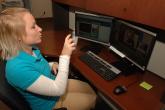
Communication Service for the Deaf (CSD) opened its new contact center on December 6, 2010, in Sioux Falls, S.D. This center is supporting a nationwide initiative to provide discounted equipment, high-speed Internet access, and life-skills training to people who are deaf and hard of hearing. Through the center’s American-Sign-Language (ASL)-trained staff, individuals who are deaf and hard of hearing will be able to purchase a video-configured Dell 11z notebook and a 3G/4G wireless Internet access plan for $230. The center’s website also contains 10 web-based “how to” training videos. Using ASL, the videos teach computer basics, technical troubleshooting solutions, and Internet search tips.
One focus of the center is to increase employment opportunities. The center will host several career training workshops, teaching interviewing skills and job search techniques for people who are deaf and hard of hearing. The center is also creating 60 new positions for ASL-trained professionals, with 40 of those positions already filled by mid-December 2010.
CSD’s ultimate goal is to create easier, more effective communications methods for people who are deaf and hard of hearing. CSD anticipates that when the project is complete, nearly 16,000 people nationwide will have access to discounted computers, high-speed broadband, and life skills training. To see local news coverage, please visit here.
Last Updated: January 13, 2011
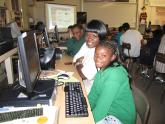
Computers for Youth (CFY) held Family Learning Workshops for more than 1,700 families in high-poverty middle schools of the Los Angeles Unified School District between October 30 and December 14, 2010. CFY celebrated the launch of the program at William Mulholland Middle School in Los Angeles’ Van Nuys neighborhood. Michelle Hahn, Executive Director of CFY-Los Angeles, joined representatives from the LAUSD Board, the Los Angeles City Council, and the California State Assembly to kick off the program and highlight the goals of the workshops.
During CFY's Los Angeles pilot program in 2009, about 600 families participated in the program with an attendance rate of approximately 70 percent due to limited funding. With BTOP funds, more than 5,000 families will participate this school year, and thus far, workshop attendance has averaged close to 85 percent. The program is able to serve sixth-grade students and their families at El Sereno Middle School, Griffith Middle School, John A. Sutter Middle School, Utah Street School, William Mulholland Middle School, and Monseñor Oscar Romero Charter School. Approximately 20 additional schools are scheduled to run workshops this school year. BTOP funding also allowed CFY to hire 18 full-time staff and several dozen part-time staff to manage school relationships, lead the family trainings, and provide customer service.
CFY's bilingual Family Learning Workshops teach low-income students and their parents about the educational uses of home technology and broadband including how to use this technology to improve learning and motivation. Parents and students are encouraged to work together and commit to an ongoing home learning effort. CFY provides participating families with a broadband-ready Home Learning Center, broadband enrollment guidance, and access to high-quality, online educational software focused on math, English, social studies, and science. CFY also provides training to teachers on leveraging educational software to extend learning into the home and drive student achievement. The program will ultimately reach more than 34,000 low-income individuals and 15,000 households in the school district.
Last Updated: October 14, 2011

















